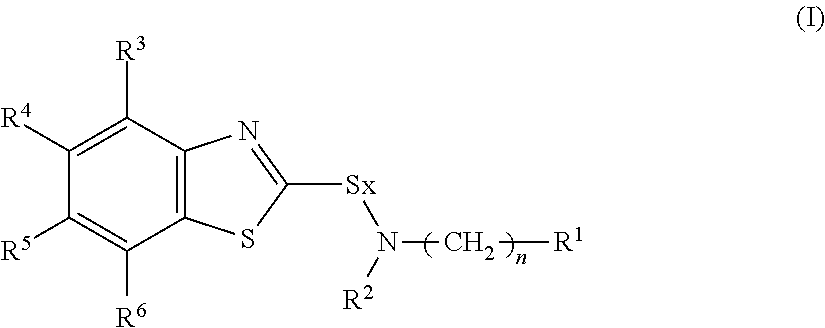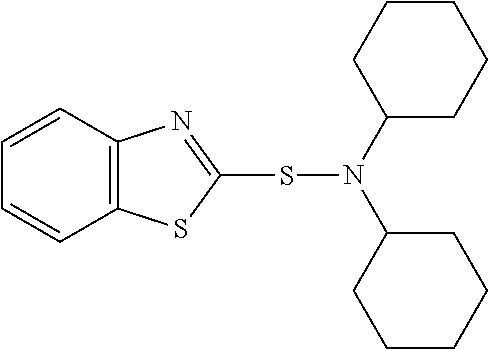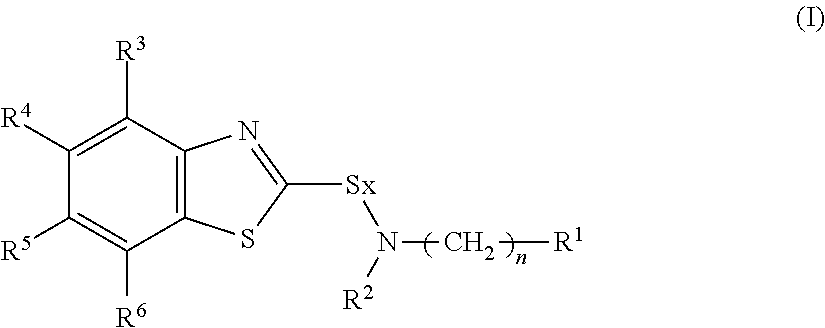Rubber composition
a technology of composition and rubber, applied in the field of rubber composition, can solve the problems of adverse effect on the physical properties of vulcanized rubber, deterioration of the appearance of vulcanized rubber, and adverse effect on the adhesive property, and achieve the effects of reducing the generation of rubber burning, excellent degradation durability, and high elastic modulus
- Summary
- Abstract
- Description
- Claims
- Application Information
AI Technical Summary
Benefits of technology
Problems solved by technology
Method used
Image
Examples
production example 1
Synthesis of N-ethyl-N-t-butylbenzothiazole-2-sulfenamide
A 12% sodium hypochlorite aqueous solution 148 g was dropwise added to N-t-butylethylamine 16.4 g (0.162 mol) at 0° C. or lower and stirred for 2 hours, and then the oil layer was separated. Bis(benzothiazole-2-yl) disulfide 39.8 g (0.120 mol), N-t-butylethylamine 24.3 g (0.240 mmol) and the above oil layer were suspended in 120 ml of methanol and stirred under refluxing for 2 hours. After cooling, the solution was neutralized by sodium hydroxide 6.6 g (0.166 mol), filtered, washed with water and concentrated under reduced pressure, and then the concentrate was recrystallized, whereby 41.9 g (yield: 66%) of targeted N-ethyl-N-t-butylbenzothiazole-2-sulfenamide was obtained in the form of white solid (melting point: 60 to 61° C.).
The spectral data of N-ethyl-N-t-butylbenzothiazole-2-sulfenamide thus obtained is shown below.
1H-NMR (400 MHz, CDCl3) δ=1.29 (t, 3H, J=7.1 Hz, CH3 (ethyl)), 1.34 (s, 9H, CH3 (t-butyl)), 2.9 to 3.4 (br...
production example 2
Synthesis of N-methyl-N-t-butylbenzothiazole-2-sulfenamide
The same procedure as in Production Example 1 was carried out, except that 14.1 g (0.162 mol) of N-t-butylmethylamine was used in place of N-t-butylethylamine, whereby 46.8 g (yield: 82%) of N-methyl-N-t-butylbenzothiazole-2-sulfenamide was obtained in the form of white solid (melting point: 56 to 58° C.).
1H-NMR (400 MHz, CDCl3) δ=1.32 (9H, s, CH3 (t-butyl)), 3.02 (3H, s, CH3 (methyl)), 7.24 (1H, m), 7.38 (1H, m), 7.77 (1H, m), 7.79 (1H, m):
13C-NMR (100 MHz, CDCl3) δ=27.3, 41.9, 59.2, 120.9, 121.4, 123.3, 125.7, 135.0, 155.5, 180.8:
mass spectrometry (EI, 70 eV): m / z; 252 (M+), 237 (M+—CH3), 223 (M+—C2H6), 195 (M+—C4H9), 167 (M+—C5H12N), 86 (M+—C7H4NS2).
An octanol / water partition coefficient (log P) of the N-methyl-N-t-butylbenzothiazole-2-sulfenamide was 4.5.
production example 3
Synthesis of N-n-propyl-N-t-butylbenzothiazole-2-sulfenamide
The same procedure as in Production Example 1 was carried out, except that 18.7 g (0.162 mol) of N-n-propyl-t-butylamine was used in place of N-t-butylethylamine, whereby N-n-propyl-N-t-butylbenzothiazole-2-sulfenamide was obtained in the form of white solid (melting point: 50 to 52° C.)
1H-NMR (400 MHz, CDCl3) δ: 0.92 (t, J=7.3 Hz, 3H), 1.34 (s, 9H), 1.75 (br, 2H), 3.03 (brd, 2H), 7.24 (t, J=7.0 Hz, 1H), 7.38 (t, J=7.0 Hz, 1H), 7.77 (d, J=7.5 Hz, 1H), 7.79 (d, J=7.5 Hz, 1H).
13C-NMR (100 MHz, CDCl3) δ: 11.7, 23.0, 28.1, 55.3, 60.4, 120.7, 121.3, 123.3, 125.7, 134.7, 154.8, 181.3.
An octanol / water partition coefficient (log P) of the N-n-propyl-N-t-butylbenzothiazole-2-sulfenamide was 5.3.
PUM
| Property | Measurement | Unit |
|---|---|---|
| mass | aaaaa | aaaaa |
| adhesion durability | aaaaa | aaaaa |
| durability | aaaaa | aaaaa |
Abstract
Description
Claims
Application Information
 Login to View More
Login to View More - R&D
- Intellectual Property
- Life Sciences
- Materials
- Tech Scout
- Unparalleled Data Quality
- Higher Quality Content
- 60% Fewer Hallucinations
Browse by: Latest US Patents, China's latest patents, Technical Efficacy Thesaurus, Application Domain, Technology Topic, Popular Technical Reports.
© 2025 PatSnap. All rights reserved.Legal|Privacy policy|Modern Slavery Act Transparency Statement|Sitemap|About US| Contact US: help@patsnap.com



